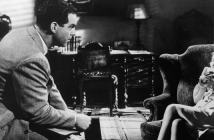
The Hunting Ground (2015)
Cast: Kirby Dick, Amy Ziering, Amy Herdy
Director: Kirby Dick
Country: USA
Genre: Documentary
Websites: Official site
Editor’s Notes: The Hunting Ground opens in limited release, today March 13th.
About two-thirds into director Kirby Dick’s (This Film is Not Yet Rated) latest documentary, The Hunting Ground, an alarming, but no less timely or essential, examination of the rape crisis on university campuses in the United States, one of the interviewees describes the personal arc undergone by several women Kirby features in The Hunting Ground: From victim to survivor to activist. It’s a fitting description for The Hunting Ground’s narrative arc as well, one that Dick and producer Amy Ziering explore with the same tenacity and thoroughness found in their previous Oscar-nominated collaboration, The Invisible War, a powerful, compelling l exposé of sexual assault and rape in the U.S. military.
Campus rapes tend to be grossly underreported by victims, often to avoid stigma or shame.
Dick deftly – and it should be added, sometimes crudely given the explicit aims of his documentary – mixes direct-to-camera interviews with multiple survivors, including several men, along with a steady stream of statistics, each set of statistics more disturbing or distressing than the last. The interviewees, mostly women in their early- to mid-twenties, help to personalize the statistics, in essence putting faces and experiences to the statistics Kirby and Ziering interweave throughout The Hunting Ground. Campus rapes tend to be grossly underreported by victims, often to avoid stigma or shame. Of reported rapes, few result in a disciplinary hearing against the accused perpetrator and even less result in any kind of significant punishment. Depending on the school, punishment can range from a small dollar fine ($25) to expulsion (an extreme rarity), but punishment becomes even less likely where fraternities or famous athletes are involved.
 With both fraternities and athletes, the driving force behind minimal or no punishments is easy to find: Money. Fraternities both help save universities money (because they provide campus housing and essentially regulate themselves) and serve as money funnels for alumni. Athletes, of course, are part of a multi-billion dollar industry. In exchange for scholarships and housing, athletes, especially top-tier athletes in high-profile, revenue-generating sports like football and basketball, can help their schools generate millions. Not surprisingly, fraternities and athletes tend to be lightly punished, if they’re punished at all, for on-campus rule-breaking or illegal behavior, including rape, resulting in an atmosphere conducive to serial offenders (thus “the hunting ground” of the title). As always, there’s a brand, the university’s brand, to protect and that often comes at the expense of the victims and survivors of campus rape.
With both fraternities and athletes, the driving force behind minimal or no punishments is easy to find: Money. Fraternities both help save universities money (because they provide campus housing and essentially regulate themselves) and serve as money funnels for alumni. Athletes, of course, are part of a multi-billion dollar industry. In exchange for scholarships and housing, athletes, especially top-tier athletes in high-profile, revenue-generating sports like football and basketball, can help their schools generate millions. Not surprisingly, fraternities and athletes tend to be lightly punished, if they’re punished at all, for on-campus rule-breaking or illegal behavior, including rape, resulting in an atmosphere conducive to serial offenders (thus “the hunting ground” of the title). As always, there’s a brand, the university’s brand, to protect and that often comes at the expense of the victims and survivors of campus rape.
Kinsman’s story serves as stark reminder of how much more has to be done before campus rape becomes a distant memory.
Universities are also driven by a fear of lawsuits, not from victims, but from accused perpetrators, often leaving victims without any meaningful recourse. Lawsuit-adverse schools also tend to focus on the victim’s behavior as opposed to the perpetrators, in effect punishing the victims for speaking out, not to mention not offering victims the stigma-free mental health counseling they both deserve and need. For two victims, Annie Clark and Andrea Pino, both former University of North Carolina (UNC) students, they decided to turn the threat of lawsuits to their favor. They hit upon the then novel solution of bringing a Title IX lawsuit against UNC for essentially creating a hostile work/campus environment, forcing UNC to defend itself in a hearing administered by the Department of Education. Clark and Pino’s success created a blueprint or template for other student activists to use against their own recalcitrant universities (and they have). As a result, more than 100 universities are currently under investigation.
Kirby shifts gears in the last half hour, however, detailing the case against Florida State quarterback, Heisman Trophy winner, and future NFL first-round draft pick Jameis Winston. Where the national media, including ESPN, deliberately sidestepped or downplayed the accusations against Winston, giving ample face time to his supporters and defenders and none to his accuser or her defenders (or skeptics), Kirby interviewed Winston’s accuser, Erika Kinsman, and her family. The story she tells should give any football/sports fan pause, not only because of Winston’s alleged actions, but also how he was treated, how quickly the school’s administrators and the local police department rushed to cover up the accusations and postpone the investigation for almost a year (so Winston could continue playing football at Florida State). Kinsman’s story serves as stark reminder of how much more has to be done before campus rape becomes a distant memory.
The Hunting Ground, an alarming, but no less timely or essential, examination of the rape crisis on university campuses in the United States



